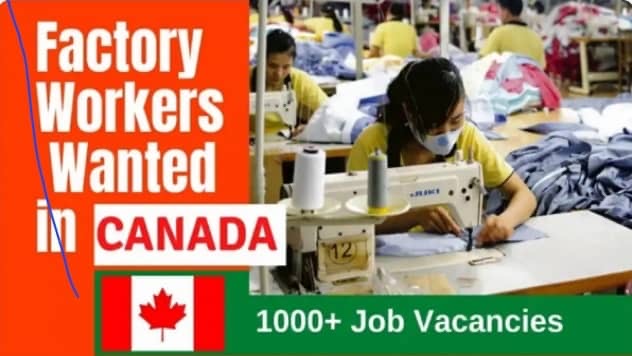Canada’s thriving manufacturing sector offers numerous employment opportunities for individuals seeking stable and rewarding careers as factory workers. With a strong emphasis on innovation, efficiency, and quality, Canadian factories produce a wide range of goods, from automobiles and machinery to food products and electronics. Moreover, for those aspiring to work and potentially immigrate to Canada, certain factory worker positions come with visa sponsorship, providing a pathway to a new life in a country known for its high standard of living and welcoming attitude toward immigrants. In this comprehensive guide, we’ll explore the landscape of factory worker jobs in Canada, the visa sponsorship opportunities available, and how aspiring workers can pursue their dreams of building a better future in the Great White North.
Understanding Factory Worker Roles in Canada: Factory workers play a crucial role in Canada’s manufacturing industry, contributing to the production, assembly, and packaging of goods across various sectors. Some of the common factory worker positions available in Canada include:
Production Worker: Production workers are responsible for operating machinery, assembling components, and performing quality control checks to ensure that products meet specifications and standards. They work in diverse industries, including automotive manufacturing, electronics, textiles, and food processing.
Machine Operator: Machine operators are skilled workers who operate and maintain manufacturing equipment, such as CNC machines, injection molding machines, and conveyor systems. They play a key role in ensuring the efficiency and productivity of factory operations.
Packaging Technician: Packaging technicians are responsible for packaging finished products, labeling containers, and preparing shipments for distribution. They work in fast-paced environments, often using automated packaging machinery and following strict quality control procedures.
Warehouse Associate: Warehouse associates work in manufacturing facilities’ warehouses, managing inventory, organizing storage areas, and preparing orders for shipment. They play a vital role in maintaining efficient logistics and supply chain operations.
Visa Sponsorship for Factory Worker Jobs: Canada offers various pathways for foreign workers to obtain visas for factory worker positions, including programs that facilitate temporary and permanent immigration. Some of the key visa sponsorship options for factory worker jobs in Canada include:
Temporary Foreign Worker Program (TFWP): Under the TFWP, Canadian employers can apply to hire foreign workers to fill temporary labor shortages in the manufacturing sector. Employers must obtain a positive Labour Market Impact Assessment (LMIA) to demonstrate the need for foreign workers and their commitment to providing fair wages and working conditions.
Provincial Nominee Programs (PNPs): Some Canadian provinces offer immigration streams specifically for individuals interested in working in the manufacturing industry. These provincial nomination programs allow eligible candidates to apply for permanent residency based on their skills, work experience, and connections to the local manufacturing sector.
Global Talent Stream (GTS): The Global Talent Stream is a fast-track work permit program designed to facilitate the entry of highly skilled foreign workers into Canada. While primarily aimed at technology and innovation sectors, certain manufacturing positions may also be eligible for the GTS, particularly those requiring specialized skills and expertise.
Application Process and Requirements: The application process for factory worker jobs in Canada with visa sponsorship typically involves the following steps:
Job Search: Begin by searching for factory worker job opportunities in Canada through online job boards, recruitment agencies, and direct employer websites. Look for employers who are willing to sponsor your visa application and meet the eligibility criteria for immigration programs.
Employer Sponsorship: Once you’ve found a suitable job opportunity, ensure that the employer is willing to sponsor your visa application and fulfill any requirements for obtaining an LMIA (if applicable). Work closely with the employer to gather the necessary documentation and complete the application process.
Visa Application: Depending on the specific program and visa category, factory workers may need to apply for a temporary work permit, permanent residency, or both. Carefully review the eligibility criteria and application requirements for the chosen immigration program and ensure that you meet all the necessary criteria.
Document Submission: Prepare and submit all required documents for your visa application, including proof of employment, educational credentials, language proficiency test results, medical exams, police clearance certificates, and any other supporting documentation requested by immigration authorities.
Visa Processing: After submitting your application, you’ll need to wait for the immigration authorities to process your visa. Processing times can vary depending on factors such as the volume of applications, program requirements, and individual circumstances.
Conclusion: Factory worker jobs in Canada offer not only stable employment opportunities but also a pathway to a new life in a country known for its economic prosperity, cultural diversity, and high quality of life. With visa sponsorship programs designed to address labor shortages and support the needs of the manufacturing sector, Canada presents an attractive destination for aspiring factory workers from around the world. By understanding the visa requirements, connecting with supportive employers, and navigating the application process with diligence and determination, aspiring factory workers can embark on a journey toward a brighter future in Canada’s thriving manufacturing industry, where their skills and contributions are valued and celebrated.



